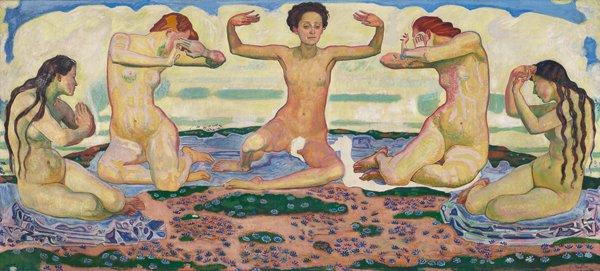Few painters of his generation did more to shape Switzerland’s cultural self-image than Ferdinand Hodler (1853–1918). His name and work have become iconic. Although the concept of a ‘national artist’ is now considered obsolete, Hodler has embedded himself firmly in the collective consciousness.
CREATING SCOPE FOR NEW INTERPRETATIONS
That perception, however, is at best a half-truth or a cliché. Values such as rootedness (the ‘woodcutter idyll’) and national sovereignty have been linked together in ways that bear little relation to Hodler’s original intentions. To underscore the topicality and complexity of this widely revered Swiss figure, a selection of contemporary artists enter into dialogue with Hodler through a mixture of existing works and others produced specially for this exhibition. Participating artists such as Caroline Bachmann (b. 1963) and Andriu Deplazes (b. 1993) became familiar with Hodler’s oeuvre through growing up in Switzerland. Others, such as Asim Abdulaziz (b. 1996) and Dani Gal (b. 1976) are discovering him for the first time. This is the first large-scale exhibition to move away from an appreciation of Hodler focused rigorously on formal aesthetics and historical narratives that paint him as a national figure. This project places him in a creative dialogue with modern-day practitioners, and questions and expands his hitherto pristine status.
SCANDALOUS ARTIST AND NATIONAL ICON: FORGOTTEN AND REDISCOVERED
The reception of Hodler’s work has ebbed and flowed. His ‘scandalous’ participation in the Secession exhibitions in Berlin and Vienna around 1900 marked him out as one of the most progressive artists of his time. Yet Hodler’s success was hard-earned, given his upbringing in a family with little money and time for education. That background, and his early preference for subjects drawn from the lives of craftspeople and workers, initially drew the approval of socialists such as Hans Mühlestein (1887–1969). When he died in 1918, Hodler was honoured as a great Swiss artist, yet his reputation faded after the Second World War. It was not until the 1980s that he came to be appreciated again in Switzerland. Although recognized by art historians as an innovator, Hodler has come to be seen by the public at large as symbolizing traditional values. For the Kunsthaus, that altering reception is an opportunity to present Ferdinand Hodler alongside and in conjunction with international contemporary artists. The exhibition concept was developed by Kunsthaus curators Sandra Gianfreda and Cathérine Hug as part of a collective, which also chose the approximately 30 invited artists. This advisory collective included artists Sabian Baumann (b. 1962), Ishita Chakraborty (b. 1989) and RELAX (chiarenza & hauser & co; since 1983). They reacted to a list of Hodler paintings which was also drawn up collectively. The exhibition was designed in association with the artist Nicolas Party (b. 1980).
LANDSCAPES, CORPOREALITIES, BELONGING, ENIGMA/TRANSCENDENCE
Entitled ‘Apropos Hodler – Current perspectives on an icon’, this exhibition is the first to locate Hodler in the context of current discourses, bringing four themes of his work into the present day: landscapes; corporealities; belonging; and enigma/transcendence. Where did Hodler stand, and how do artists today position themselves in relation to these discourses? The topics covered include climate change, stewardship of resources, and the representation of human beings and their bodies against the backdrop of fluid identities. The presentation asks questions such as ‘what role do the need for belonging and an awareness of origin play in a globalized world?’
SOME 130 WORKS ON DISPLAY
The Kunsthaus Zürich, which is home to the largest public collection of Hodler’s works next to the Musée d’art et d’histoire in Geneva, is looking beyond its own holdings for this exhibition, and has secured the loan of key exhibits from other public and private collections in Switzerland. Some 60 pieces by Hodler are joined by the works of 30 contemporary artists from different cultural regions: Asim Abdulaziz, Laura Aguilar, Caroline Bachmann, Sabian Baumann, Denise Bertschi, Ishita Chakraborty, Andriu Deplazes, Latifa Echakhch, Eva Egermann & Cordula Thym, Marianne Flotron, Dani Gal, María Elena González, Christina Hemauer & Roman Keller, David Hockney, Sasha Huber, Roland Iselin, Frantiček Klossner, Nils Amadeus Lange, Izidora I LETHE, Urs Lüthi, André M’Bon, Uriel Orlow, Nicolas Party, RELAX (chiarenza & hauser & co), Ugo Rondinone, Susan Schuppli, Selma Selman, Milva Stutz and Latefa Wiersch.
Supported by UBS, Partner Kunsthaus Zürich, and Boston Consulting Group (BCG).
PUBLICATION
The exhibition is accompanied by a publication in German and English conceived by Sandra Gianfreda and Cathérine Hug containing essays, interviews and poems by art historians, writers and artists Sabian Baumann & Olga Stefan, Diana Blome & Niklaus Manuel Güdel, Monika Brunner, Ishita Chakraborty, Matthias Frehner, Sandra Gianfreda & Cathérine Hug, Kim de l’Horizon, Siri Hustvedt, Mariam Kühsel-Hussaini, Rachel M’Bon and RELAX (chiarenza & hauser & co). It is published by Wienand Verlag, Cologne.
GUIDED TOURS
Guided tours in German take place on Sundays at 11 a.m. There are additional tours on Thursdays at 6.30 p.m. during March, April and June, and on Fridays at 3 p.m. in May. English: Sun 14 April, 11 a.m., French: Sun 19 May, 11 a.m.
PERFORMANCES
Three performances by Nils Amadeus Lange, Izidora I LETHE and Latefa Wiersch developed specially for this exhibition are currently in the planning stage, as are artist talks and a film programme in association with the Arthouse Piccadilly cinema. Details will be available from early March at www.kunsthaus.ch
Kunsthaus Zürich/Zürcher Kunstgesellschaft
Winkelwiese 4
CH8001 Zürich
Telefon: +41 (44) 2538413
Telefax: +41 (44) 2538433
http://www.kunsthaus.ch
Telefon: +41 (44) 2538484
![]()

